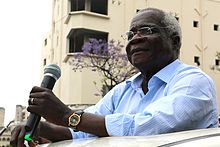Afonso Dhlakama
| Afonso Dhlakama | |
|---|---|
 |
|
| Leader of RENAMO | |
|
Assumed office 17 October 1979 |
|
| Preceded by | André Matsangaissa |
| Personal details | |
| Born |
1 January 1953 Mangunde, Sofala Province Portuguese Mozambique |
| Nationality | Mozambican |
| Political party | RENAMO |
Afonso Marceta Macacho Dhlakama (born 1 January 1953) is a Mozambican politician and the leader of RENAMO, an anti-communist guerrilla movement that fought the FRELIMO government in the Mozambican Civil War before signing a peace agreement and becoming an opposition political party in the early 1990s. Dhlakama was born in Mangunde, Sofala Province.
After RENAMO's first leader, André Matsangaissa, was killed by Mozambican government forces in 1979, Dhlakama became leader. By 1984, Dhalakama was both commander in chief of RENAMO's forces and head of the governing body, the 12-member executive council. As leader of RENAMO Dhlakama sought to destabilise the FRELIMO government through guerilla strategies. Under his command RENAMO reached the peak of its power, controlling large parts of the country, especially in the north and being able to carry out raids virtually anywhere outside the major cities. In its fight RENAMO was supported by conservative circles in some western countries, including the United States, West Germany, and most importantly by the white led governments of Rhodesia and South Africa to whom FRELIMO-ruled Mozambique was a target due to its support of rebel movements within their countries. However, the end of the cold war, the collapse of Rhodesia's Smith government and, most importantly, the transition taking place in South Africa eventually deprived RENAMO of its financial supporters and arms suppliers. Thus, RENAMO and FRELIMO, which had also lost its supporters from the eastern power block, finally signed a peace treaty in October 1992. RENAMO subsequently transformed itself into a legal political party under the continued leadership of Afonso Dhlakama.
According to the US State Department and some other sources, under Dhlakama's leadership RENAMO systematically committed crimes against humanity as part of its war effort. These include mass killing and mutilation of non-combatants during raids on villages and towns as well as systematically forcing civilians into RENAMO's employment, though FRELIMO had used similar methods during its fight against the Portuguese. What differed was the abduction of children to use them as child soldiers. It is estimated that one third of RENAMO forces were under 18. Abducted people also had to serve RENAMO in administrative or public service functions in the areas it controlled. Refusing to work for RENAMO would be punished by heavy beating or even on-the-spot execution as were flight attempts, though this was also used by FRELIMO. One particularly gruesome practice was the mutilation and killing of children left behind by escaped parents.
...
Wikipedia
